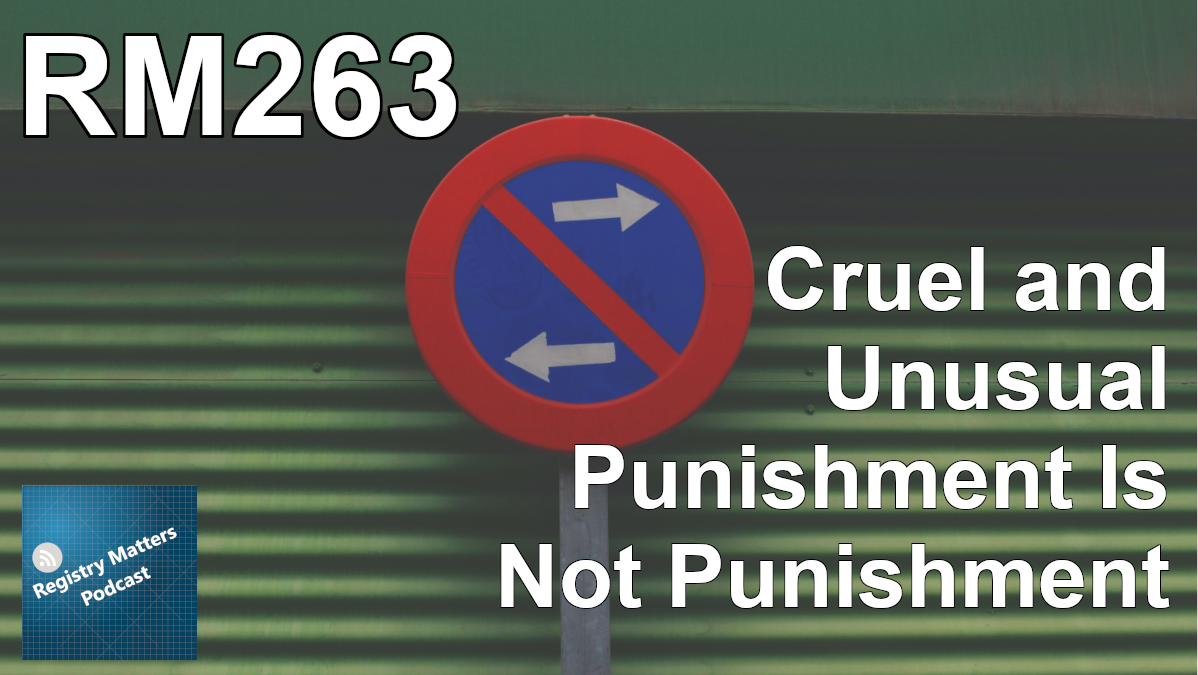Most people who have to register for a sexual offense think the registry seems like punishment. But is it “cruel and unusual” punishment? Making it difficult for individuals to find places they can live seems cruel. Some of the restraints placed upon registrants seem cruel as well.
And it is unusual that individuals would have their address and personal information available on the internet up to 30 years after they have served time for their offense.
But “cruel and unusual” is a high bar to meet, considering that in many states the death penalty is not “cruel and unusual.”
In The Michigan Court of Appeals versus Andrew Michael Swofford, Swofford’s attorney attemtped to convince the court that lifetime registration was cruel and unusual punishment. His argument was unsuccessful.
In Michigan, SORA Tier III offenders must report any changes to their residence, employment, e-mail address, and telephone number, and must report in person four times per year to verify their residence. It is easy to see that these are disabilities and restraints that impose onerous burdens on registrants. However, those restraints do not meet the legal standard for “cruel and unusual” punishment.
This is not to say that elements of the registry are more than a “civil regulatory scheme.” However, when discussing how to bring legal challenges before a court, it is essential to understand the nuances of laws and legal decisions. Cruel and unusual is a type of punishment. But legally, it is a type of punishment that is not applicable to the restraints that individuals on the sex offender registry face.
To a Person Forced to Register, or PFR, the registry seems like punishment. But if the registry is considered a “civil regulatory scheme,” it is no more punishment than having to get a driver’s license or register a vehicle. In order for the registry to be seen as punishment, a case has to be built properly, and the language used in the courts must be precise.
We also discuss ways that a PFR can be involved in the legislative process. First, build a relationship with a legislator or staff member if that is possible. Unless a PFR had a high-profile case, there is little chance that the legislator will take the time to find out if that individual is on the registry. Secondly, there are other ways to support candidates who are sympathetic to the plight of people forced to register for a sexual offense. Literature drops, phone banks, and monetary donations are three of those.
Highlights
[03:20] Engaging with state lawmakers. [19:35] Professional wrestling, fake news, and civil regulatory schemes [39:20] The Michigan Court of Appeals versus Andrew Michael Swofford. [58:50] Police and Qualified immunity legislation. [1:03:01] Lowering the threshold for a jury to recommend the death penalty.How to Contact and Listen to Registry Matters
https://www.registrymatters.co/podcast/rm263-cruel-and-unusual-punishment-is-not-punishment
Leave voicemail: 747-227-4477
Email us: registrymatterscast@gmail.com
Support us on Patreon: https://www.patreon.com/registrymatters
Follow us on Twitter: https://twitter.com/RegistryMatters
Join the Discord server: https://discord.gg/6FnxwAQm57
Want to support Registry Matters with some swag: https://shop.spreadshirt.com/registry-matters
Apple Podcasts: https://itunes.apple.com/us/podcast/registry-matters/id1305039280
Google Play Music: https://play.google.com/music/listen?u=0#/ps/Icuxbpzvyti7wtoredipbtiojqy
RSS: https://www.registrymatters.co/feed/podcast/
Spotify: https://open.spotify.com/show/3d75P7Kc37n2l79m89F9KI
YouTube: https://www.youtube.com/registrymatters
The Registry Matters Podcast’s mission is to cover issues surrounding the Registry. We cover cases that will peel back the veneer of what we need to do to change our lives for the better. We cover news articles that spark conversations about the total insanity of this modern day witch hunt. This podcast will call out bad policy and call out those that are making bad policy.
To change things for the positive, we need to act. We are 6-7-8-900k strong. With that many people, plus their friends and family, over a million people are affected by the registry. We should be able to secure donations to hire lawyers and lobbyists to move the agenda in our favor. We need our people to be represented.


Ken Maples
April 25, 2023 7:36 pmI know there are lot of people are concerned about the sex offender registry. 26 years ago I was charged and convicted of two sex offenses stemming from the same incident in Texas. I completed my sentence in 2006 and was only required to register as a sex offender. I was listed as a level 1 low risk. In March of 2018 I moved from Texas to Wisconsin after Hurricane Harvey. I immediately registered and stayed compliant. 7 months later in October 2018 I received a letter from the Wisconsin DOC advising me if I worked or went to school I would be required to wear an ankle monitor. Not working was not an option. Now that I am wearing the ankle monitor I will be required to wear it as long as I live in Wisconsin. 181 registered sex offenders in Wisconsin who had completed their sentences were required to wear ankle monitors because of this statute after the fact. There was no due process or risk assessment. A lawsuit had been filed against statute 301-48 but the far right Conservative Republican Supreme Court rejected the lawsuit. The case was appealed in the 7th District Court which upheld the Wisconsin Supreme Court ruling. The statute should be a violation of the 4th amendment protection against illegal search and seizure. It also violates the 5th and 14th Amendment lack of due process. The state of Wisconsin claims the ankle monitor is not considered punishment or punitive despite paying a monthly fee. Wisconsin legislators must believe the ankle monitor is a fashion accessory? There is also confusion in their definition of a repeat habitual offender and a person with two or more convictions. It is common practice for prosecutors to split and file multiple charges regarding one incident. This should not make a person a repeat habitual offender. In a recent Wisconsin Supreme Court election the Conservative Republican was voted out and replaced with a liberal Democrat. This ended a 15-year Conservative Republican controlled Supreme Court in Wisconsin. Judge Janet Protasiewicz will be sworn in this coming August and I’m hoping this will bring back fairness and following the US Constitution when making decisions. I am looking forward to being a part of a class action lawsuit. I made a horrible mistake and poor judgment 26 years ago and I have long since paid for that mistake. In 2018 Wisconsin legislators made a horrible mistake and they should be held accountable.